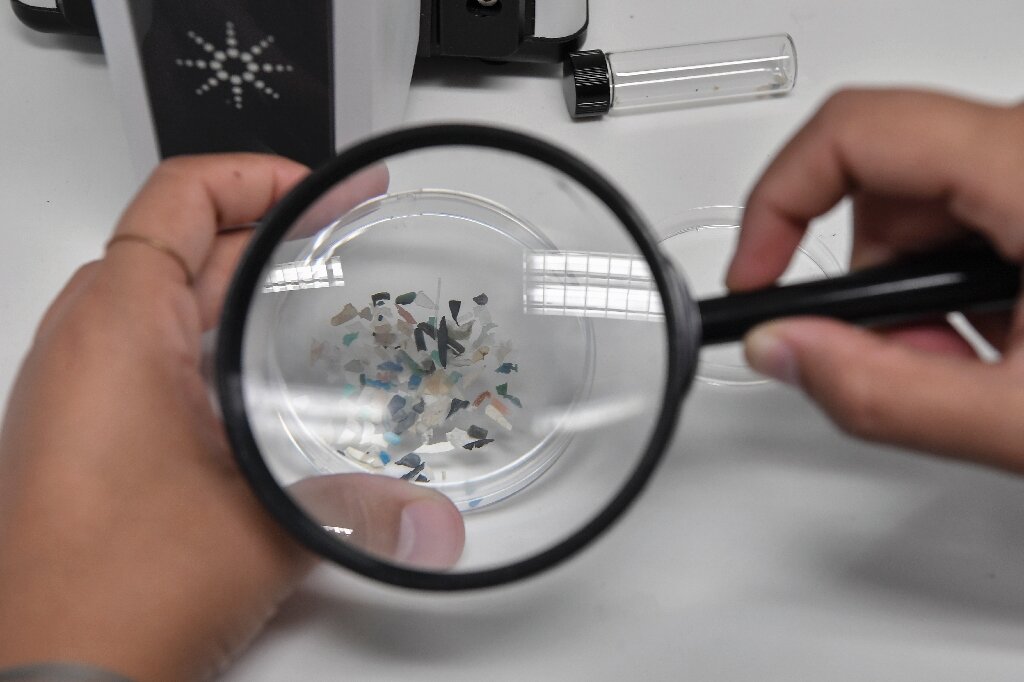Scientists in the Netherlands have discovered microplastics in human blood for the first time from nearly 80 percent of 22 anonymous, healthy volunteers, warning that the ubiquitous particles could also be making their way into organs.
Half of the blood samples showed traces of PET plastic, widely used to make drink bottles, while more than a third had polystyrene, used for disposable food containers and many other products.
The Dutch study was published in the Environment International journal.
The microplastics, tiny pieces of mostly invisible plastic, have already been found almost everywhere from the deepest oceans to the highest mountains as well as in the air, soil, and food chain.
According to Dick Vethaak, an ecotoxicologist at Vrije Universiteit Amsterdam, it was the first time they detected and quantified such microplastics in human blood, which is proof that we have plastics in our body -- and we shouldn't.
He added that further research is needed to investigate how it could impact health by determining where it is going in the body, if it can be eliminated or excreted, or if it is retained in certain organs, or able to pass the blood-brain barrier.
The study said the microplastics could have entered the body via air, water, or food, and in products such as particular lip glosses, toothpaste, and tattoo ink.
Vethaak added that there could be other kinds of microplastics in the blood that his study did not pick up as it could not detect particles larger than the diameter of the needle used to take the sample.
The study was funded by the Netherlands Organisation for Health Research and Development UK-based Common Seas, which aims to reduce plastic pollution.



 Lake beds are rich environmental records — studying them reveals much about a place’s history
Lake beds are rich environmental records — studying them reveals much about a place’s history  NASA Resumes Cygnus XL Cargo Docking with Space Station After Software Fix
NASA Resumes Cygnus XL Cargo Docking with Space Station After Software Fix  LA fires: Long-term exposure to wildfire smoke is poorly understood − and a growing risk
LA fires: Long-term exposure to wildfire smoke is poorly understood − and a growing risk  Trump Administration to Launch Autism Initiatives Targeting Acetaminophen Use and New Treatment Options
Trump Administration to Launch Autism Initiatives Targeting Acetaminophen Use and New Treatment Options  Burkina Faso and Mali’s fabulous flora: new plant life record released
Burkina Faso and Mali’s fabulous flora: new plant life record released  Trump Signs Executive Order to Boost AI Research in Childhood Cancer
Trump Signs Executive Order to Boost AI Research in Childhood Cancer  Novo Nordisk Warns of Profit Decline as Wegovy Faces U.S. Price Pressure and Rising Competition
Novo Nordisk Warns of Profit Decline as Wegovy Faces U.S. Price Pressure and Rising Competition  How ongoing deforestation is rooted in colonialism and its management practices
How ongoing deforestation is rooted in colonialism and its management practices  FDA Targets Hims & Hers Over $49 Weight-Loss Pill, Raising Legal and Safety Concerns
FDA Targets Hims & Hers Over $49 Weight-Loss Pill, Raising Legal and Safety Concerns  Sanofi’s Efdoralprin Alfa Gains EMA Orphan Status for Rare Lung Disease
Sanofi’s Efdoralprin Alfa Gains EMA Orphan Status for Rare Lung Disease  Is space worth the cost? Accounting experts say its value can’t be found in spreadsheets
Is space worth the cost? Accounting experts say its value can’t be found in spreadsheets  Ukraine minerals deal: the idea that natural resource extraction can build peace has been around for decades
Ukraine minerals deal: the idea that natural resource extraction can build peace has been around for decades 































